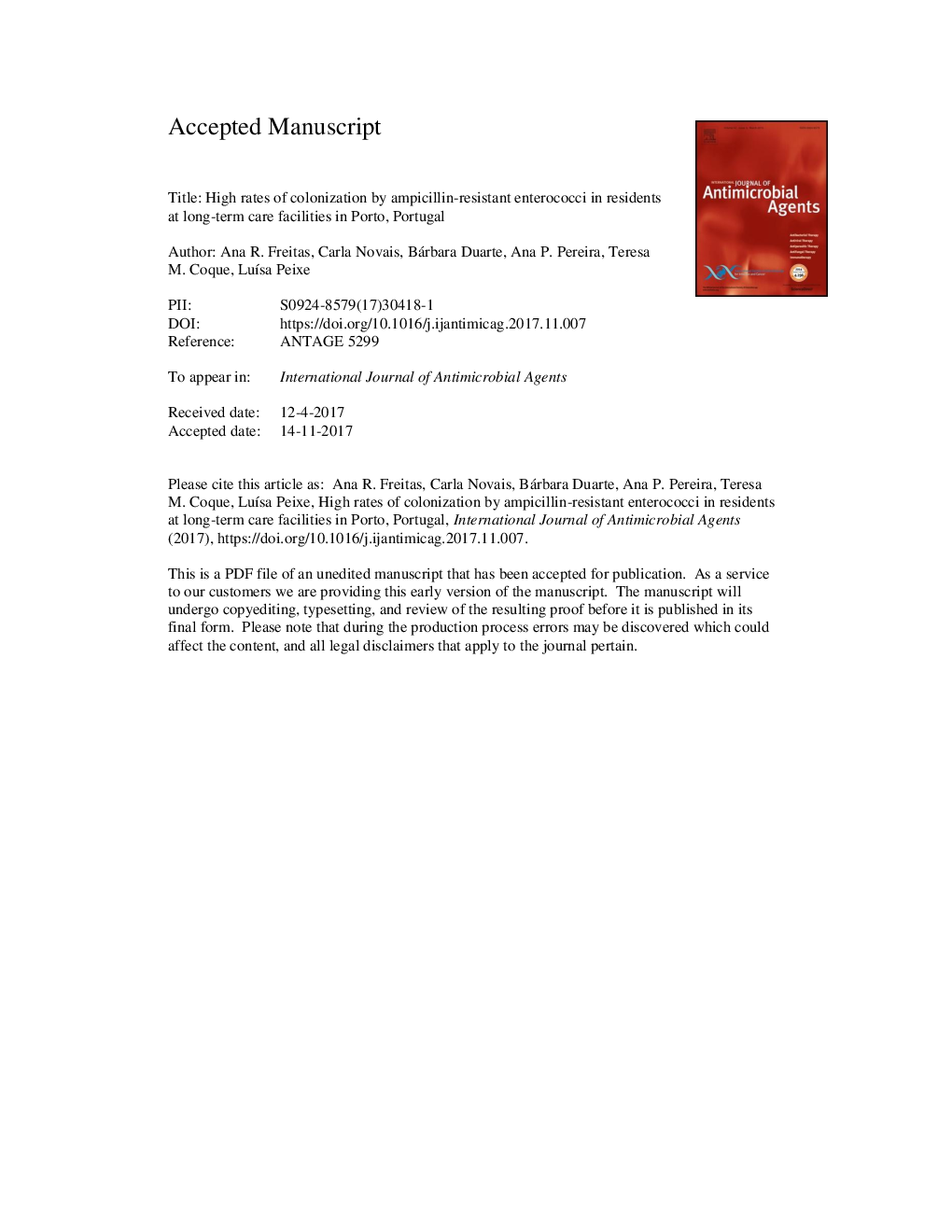| کد مقاله | کد نشریه | سال انتشار | مقاله انگلیسی | نسخه تمام متن |
|---|---|---|---|---|
| 8738645 | 1591731 | 2018 | 17 صفحه PDF | دانلود رایگان |
عنوان انگلیسی مقاله ISI
High rates of colonisation by ampicillin-resistant enterococci in residents of long-term care facilities in Porto, Portugal
ترجمه فارسی عنوان
نرخ بالای کلونیزاسیون توسط انتروکوک مقاوم به آمپی سیلین در ساکنین مراکز درازمدت در پورتو، پرتغال
دانلود مقاله + سفارش ترجمه
دانلود مقاله ISI انگلیسی
رایگان برای ایرانیان
کلمات کلیدی
موضوعات مرتبط
علوم زیستی و بیوفناوری
ایمنی شناسی و میکروب شناسی
میکروبیولوژی و بیوتکنولوژی کاربردی
چکیده انگلیسی
This study evaluated the occurrence of enterococci resistant to clinically relevant antibiotics in long-term care facility (LTCF) residents in Porto, Portugal, a region with high rates of multidrug-resistant enterococci in infected patients and healthy carriers. Faecal samples from 48 residents in two LTCFs (2015-2016) were enriched (with/without antibiotics) and plated on Slanetz-Bartley with/without the same antibiotics (ampicillin/vancomycin/linezolid). Two colonies per morphology/sample were selected for susceptibility testing and species identification. Clonality was established by PFGE and MLST. Genes coding for vancomycin resistance (vanA/vanB), virulence and plasmids (replicases) were searched by PCR. A total of 285 isolates were obtained, comprising Enterococcus faecalis, Enterococcus faecium, Enterococcus raffinosus and Enterococcus avium colonising 83%, 77%, 27% and 10% of residents, respectively. Residents from both LTCFs were colonised with vancomycin-resistant E. faecium (VanA-VREfm) (4 residents; 8%) and/or ampicillin-resistant (AmpR) (24 residents; 50%) E. raffinosus, E. faecium and E. avium. Enterococcus faecium previously associated with major human clonal lineages (ST18/ST78) or animal clones (ST393) were identified. Some PFGE types of E. faecium, E. raffinosus and E. avium were shared by residents of both LTCFs. Recent antibiotic exposure was significantly associated with colonisation by AmpR enterococci. Residents from Portuguese LTCFs were colonised with high rates of AmpR enterococci and similar rates of VREfm compared with other EU countries. A high colonisation rate with widespread enterococcal lineages that could be selected by antibiotic consumption in LTCFs was uncovered. These findings suggest that antimicrobial stewardship is warranted in LTCFs, which constitutes a significant challenge in a home-based setting.
ناشر
Database: Elsevier - ScienceDirect (ساینس دایرکت)
Journal: International Journal of Antimicrobial Agents - Volume 51, Issue 3, March 2018, Pages 503-507
Journal: International Journal of Antimicrobial Agents - Volume 51, Issue 3, March 2018, Pages 503-507
نویسندگان
Ana R. Freitas, Carla Novais, Bárbara Duarte, Ana P. Pereira, Teresa M. Coque, LuÃsa Peixe,
